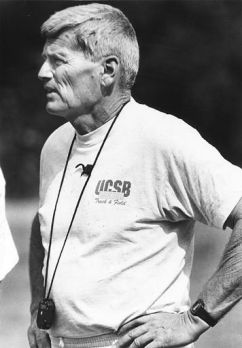Sam Adams, world-class decathlete, coach and mentor to numerous athletes passed away Tuesday, January 12.
“The finest decathlon coach in American history,” wrote Frank Zarnowski for The Decathlon Association newsletter. “The decathletes, pentathletes and heptathletes who trained under Sam’s watchful eye read like an American Who’s Who. You start with Bill Toomey and Jane Frederick, and Russ Hodge, and, well the list would go on and on. Eight (8!) of his decathletes qualified for the 1984 U.S. Olympic Trials. Nobody ever came away from Sam’s guidance unprepared nor uninspired.”

Local coach Harry Marra said, “My memories of training… will always be my inspiration to keep me moving forward with the utmost of ethics. Sam would have demanded it be that way.”
What I remember most about my friend Sam were the hikes we would take in the hills above our little community. I’d call him “the machine,” because his stride and pace would remain the same no matter the terrain. I remember the conversations we’d have on those hikes. When basketball coach Bobby Knight was fired from Indiana University, Sam was offended that any coach with an attitude such as Knight’s would have kept his job that long.
Sam’s response to my What Do You Stand For? questionnaire makes clear the importance of character-driven coaching.
“My athletic background has had a strong influence on my life. Brutus Hamilton was my track and field coach while I was a student at UC Berkeley. He was much more than a coach. For me, he was an inspiration. His team was his family, and we were proud to be thought of as such. Brutus had a saying, ‘My boys stay coached.’ He taught us how to win and what to do when you lose. More importantly, he would teach you how to be a real person in life.
“I have competed at relatively high levels including two Olympic trials in track and field: the javelin throw and the decathlon. In the decathlon, I was in the top five twice. Competing in these events taught me a lot. I learned that winning is not everything and that satisfaction does not need a “win” to be satisfying.
“I feel very strongly that in my realm we need a code of ethics. And more importantly, follow it. At present, we have a situation where the most important thing for an individual is to ‘win, be the best.’ But, because of obvious limitations, this can only be achieved by a limited number of people. In my opinion, the most important thing and the principal goal I have attempted to foster in all the athletes I have worked with is to do your very best. Individual achievement is a precious goal.
“My ‘moment of principle’ occurs every time I talk to my team or any member of it. I try to follow the principle: do your very best. This is not a goal that you attempt without thought. What is “very best?” It is a goal that is achieved by work, study, and understanding and, most of all, a love of what you are achieving and doing without the use of illegal substances.
“My purpose in working with these kids is threefold. I want to help them enjoy what they are doing, build confidence in their knowledge of the mechanics of the events, and understand that taking second or third is not losing.
“Any person who accepts the challenge and enjoys the effort and the lifts from competition is not a loser. The loser is one who quits because he or she cannot win.”
“A man’s growth,” Emerson wrote, “is seen in the successive choirs of his friends.”
In Sam’s case, that makes for one heck of a choir. I’m only glad he never asked me to actually sing.
Comments










